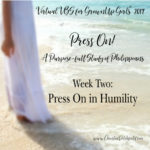The truth is we’ve all been there. We sit down with our Bibles and the best of intentions… but five minutes and three pages later, we have no idea what we’ve just read. We do know we need to remember to pay the cable bill and switch the laundry over and send that email and figure out what to do about that problem at work or school or church.
As we get ready to start our Virtual VBS for GrownUp Girls® summer Bible study, I want to share with you five things that help me focus on the Words I’m reading … I think you’ll find they help you, too!

1) Start with prayer. When you’re short on time or you finally sit down to read, it’s tempting to dive right in. But pause for just a few seconds to calm your spirit. Offer this time to God. Ask Him to meet you right where you are – to open your eyes, open your ears, open your mind and your heart to His truth.
“Every day we live is a priceless gift of God, loaded with possibilities to learn something new, to gain fresh insights into His great truths.” – Dale Evans Rogers
2) Mix it up. Use a different translation than the one you usually do. The unfamiliar wording will force you to pay more attention to what you’re reading. You’ll see things you never noticed before. Wait… does it really say that? Is that what that verse really means? You’ll find yourself reaching for other translations to compare. (You can also use a website like www.BibleGateway.com to read a verse or passage in multiple English language translations.)
3) Read it once more, with feeling! Take your time and read slowly. Read out loud, if you can. Take a key verse and repeat it, putting the emphasis on a different word each time. For example, 2 Corinthians 12:9:
“MY grace is sufficient for you…”
“My GRACE is sufficient for you…”
“My grace IS sufficient for you…”
“My grace is SUFFICIENT for you…”
“My grace is sufficient for YOU…”
4) Mark it up. Use colored pencils, pens, or highlighters to mark key words – especially those that answer the 5 W’s and an H: Who, What, When, Where, Why, and How.
(If you need more direction, Kay Arthur has developed a detailed method you can adopt – or adapt – called “Inductive Bible Study.”)
If you don’t want to mark up the Bible you have, think about purchasing an inexpensive Bible just for this purpose – try your local thrift store or half price bookshop! Or make copies or print out the passages you’re studying from www.BibleGateway.com or www.BibleHub.com. Just be sure to keep them in a folder or notebook you can refer back to. If you’re tech savvy, you can use the highlighting tools in the many Bible apps available for your smart phone or eReader.
5) Put it in your own words. Every few verses, stop and paraphrase what you’ve just read. Imagine you’re explaining it to a friend or family member – especially someone new to the Bible or younger in their faith. Draw on anything else you know about the background and context of the passage. Try to come up with an example or illustration of its truth. Relate it to your own life or to our world today.
“Whatever need or trouble you are in, there is always something to help you in your Bible, if only you go on reading ‘til you come to the word God specially has for you… but you must go on ‘til you find it, for it is always somewhere. You will know it the moment you come to it, for it will rest your heart.” – Amy Carmichael
On the days when you don’t have the time to go on – when you just have to get on with the day – remember what God says about His Word: “I send it out, and it always produces fruit. It will accomplish all I want it to, and it will prosper everywhere I send it.” (Isaiah 55:11 NLT)
………..
What things have helped you get more out of your Bible study time?






